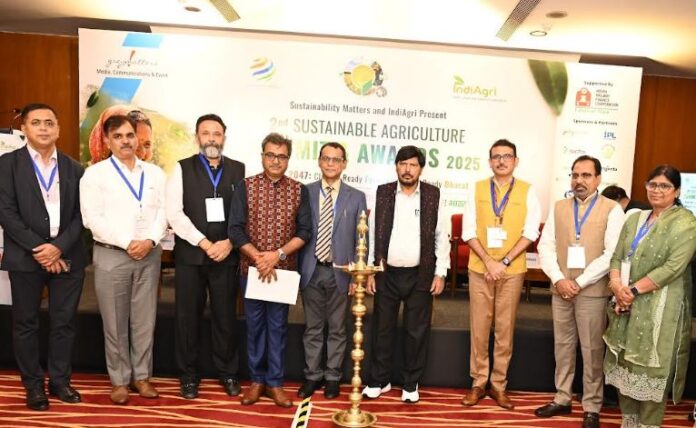New Delhi, Delhi, India | 13th August 2025: As India advances towards its goal of becoming the world’s largest economy by 2047, Union Minister of State for Social Justice & Empowerment Ramdas Athawale emphasized that the nation’s progress hinges on empowering farmers and adopting sustainable agriculture practices. Speaking at the 2nd Sustainable Agriculture Summit & Awards 2025 in New Delhi, Athawale stressed that farmer welfare and environmental sustainability must remain central to the vision of Viksit Bharat as outlined by Prime Minister Narendra Modi.
Organized by Sustainability Matters and IndiAgri, and supported by Indian Railway Finance Corporation (IRFC), Godrej Agrovet, IPL Biologicals, SIDBI, and Hindustan Urvarak & Rasayan Limited (HURL), the summit gathered progressive farmers, industry leaders, scientists, development practitioners, and senior bureaucrats from across India.
Agriculture as the Foundation of Inclusive Growth
“A strong agricultural base ensures that India’s economic growth remains inclusive and resilient,” Athawale said, adding that integrating environmental protection with farmer-centric policies will be key to long-term prosperity.
Dr. Jayadev Sarangi, IAS (Retd), underscored that agriculture today is both a food security pillar and a strategic economic driver. He stated, “Every investment in sustainable agriculture strengthens national stability and boosts global competitiveness.”
Need for Financial Innovation in Climate-Smart Agriculture
While India’s agri-credit flow surpassed ₹20 lakh crore in FY2024, much of it is directed toward short-term loans rather than climate-resilient infrastructure. Manoj Kumar Dubey, CMD of IRFC, called for public-private collaboration to unlock capital for green farming innovations, labeling it an “investment in India’s economic future.”
District-Level Success Stories Driving Change
Execution at the grassroots level remains crucial. Deepshikha, IAS, Collector & District Magistrate, Ferozepur, shared how her district promotes chilli cultivation between paddy and wheat cycles to improve incomes, soil health, and environmental balance. She was among six IAS officers honored for sustainable agricultural initiatives, including Ravi Anand (Jamtara), Pamela Satpathy (Karimnagar), Hari Chandana (Hyderabad), Himanshu Nagpal (Varanasi), and Rajesh Jogpal (Haryana).
Market Linkages and Rural Entrepreneurship
Speakers agreed that local innovations must be paired with strong market connections and rural entrepreneurship to maximize farmgate value. Dr. Rajendra Prasad of SIDBI highlighted the role of financing in agri-entrepreneurship and called for greater collaboration to channel international climate funds into the sector.
Science, Technology, and Responsible Farming
Industry leaders emphasized technology’s role in achieving climate-resilient agriculture:
- Dr. Vimala Prakash, IPL Biologicals, showcased biological inputs and data-driven precision farming.
- Siba P. Mohanty, HURL, advocated for water-smart farming, zero liquid discharge systems, and nutrient management to merge environmental responsibility with economic growth.
Krishi 2047 and Recognizing Agri Excellence
Dr. Navneet Anand, Executive Director, Sustainability Matters, said the summit’s Krishi 2047 vision aims to scale successful local models nationally.
The awards honored innovators including Godrej Agrovet, IPL Biologicals, HURL, SeedWorks International, Bihar Agricultural University, Love Kumar (Jamtara), ATMA Bhagalpur, Agri Entrepreneur Growth Foundation, Dhaksha, and the Federation of Seed Industry of India.








